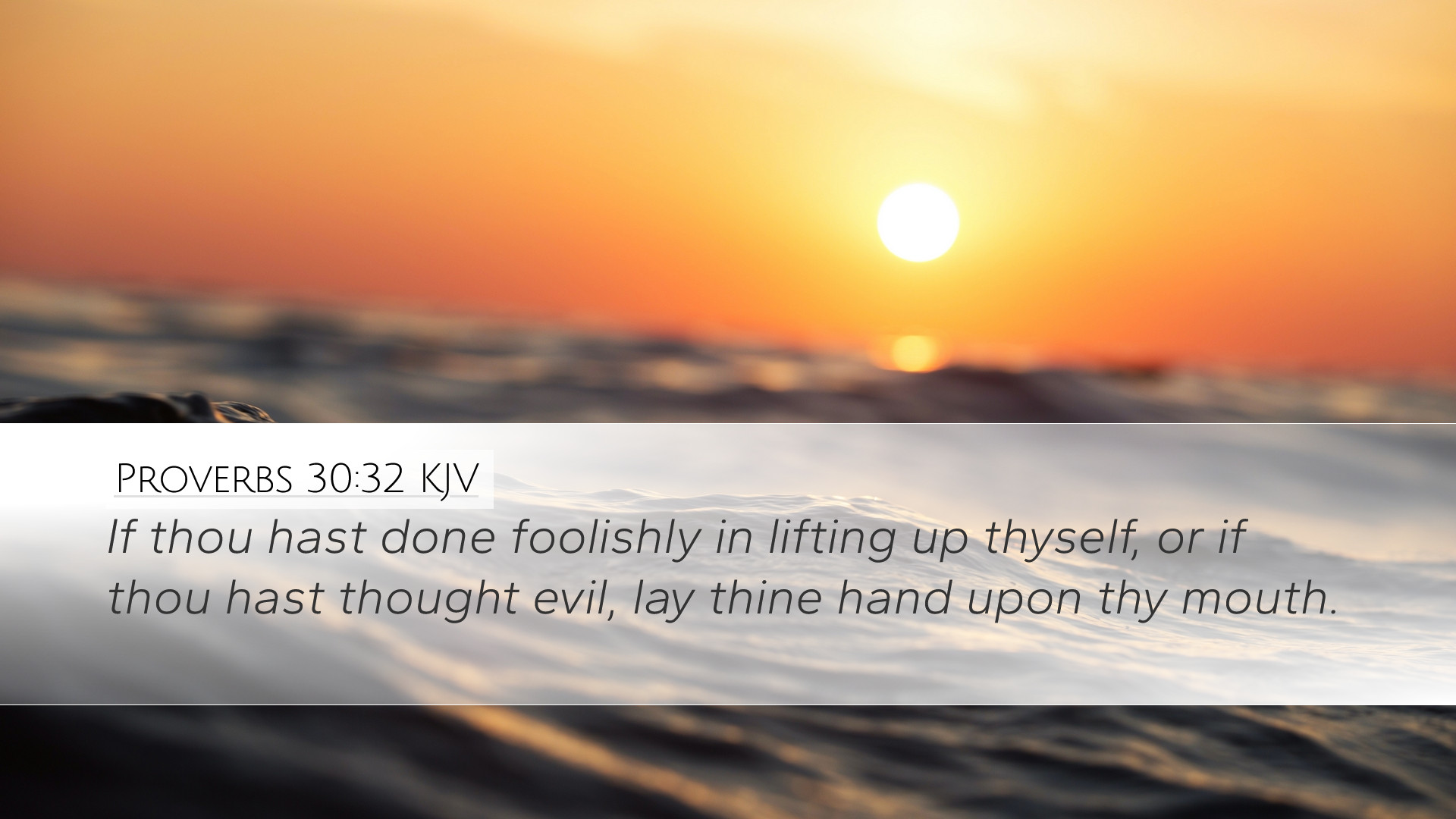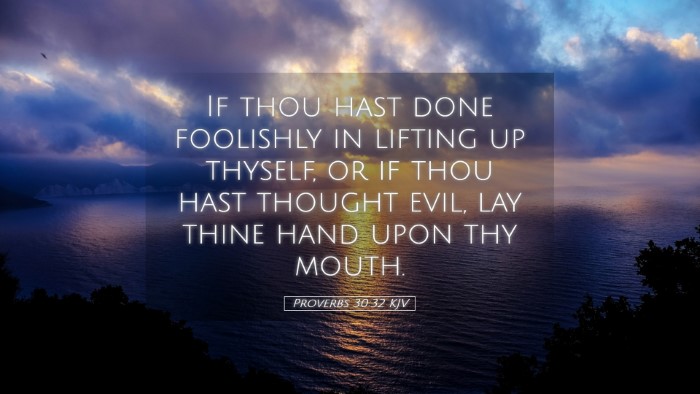Commentary on Proverbs 30:32
Verse Text: "If thou hast done foolishly in lifting up thyself, or if thou hast thought evil, lay thine hand upon thy mouth."
Introduction
The Book of Proverbs is rich with wisdom, often providing practical advice and reflections on human behavior and divine principles. Proverbs 30:32 serves as a caution against pride and malice, reminding readers of the consequences that accompany such attitudes. In this commentary, we will explore insights from notable public domain commentaries by Matthew Henry, Albert Barnes, and Adam Clarke to elucidate the verse’s meaning, context, and application.
Exegesis of Proverbs 30:32
King Solomon and Agur, the author of this section, share profound wisdom traits. This verse warns against self-exaltation and evil thoughts, both of which are temptations common to humanity. The instruction to "lay thine hand upon thy mouth" signifies the importance of self-control and the wisdom of silence in the face of personal failure or wrongful thoughts.
Insights from Matthew Henry
Matthew Henry emphasizes the folly of self-promotion, stating that those who lift themselves up expose themselves to ridicule and the consequences of their pride. He notes that the phrase "lay thine hand upon thy mouth" serves as a metaphor for the restraint of speech when confronted with one's missteps. Henry articulates that admitting one's faults and silencing oneself is a wiser choice than speaking foolishly in defense of one's pride.
- Pride and Its Consequences: Henry highlights that lifting oneself up is not merely an act of seeking esteem; it is often accompanied by malicious intent, reflecting deeper issues of the heart.
- Self-Reflection: The call to respond to one’s actions with silence encourages individuals to reflect inwardly instead of outwardly criticizing others or justifying their actions.
Insights from Albert Barnes
Albert Barnes interprets this verse as a guideline for moral and spiritual conduct. He states that when one realizes they have acted foolishly, particularly in arrogance or evil thoughts, the wise course of action is to be silent and reflect on the consequences of such behaviors. Barnes asserts that this admonition serves both as a warning and an invitation for self-examination.
- The Danger of Conceit: Barnes articulates the peril that comes with a conceited heart, which can blind individuals to their faults and lead to further folly.
- Wisdom in Silence: He advocates for the idea that restraint in speech often speaks louder than words, particularly when faced with the repercussions of one’s behavior.
Insights from Adam Clarke
Adam Clarke provides a comprehensive look at the language and cultural context of Proverbs 30:32. He stresses the importance of the underlying Hebrew terms that convey self-elevation and evil contemplation. Clarke connects the act of lifting oneself up with a deep-seated pride that ultimately leads to downfall. He also presents the concept of laying one’s hand upon the mouth as a gesture of humility and self-discipline.
- Humility as Strength: Clarke argues that recognizing one's limitations and suppressing the impulse to boast are indicators of true strength of character.
- Cultural Implications: He goes into detail about the cultural significance of speech and silence in ancient societies, illustrating how a wise person is measured not just by their knowledge but by their ability to act thoughtfully and quietly.
Theological Relevance
This verse holds significant theological weight, as it invites reflection on human nature’s propensity for hubris and the ensuing moral, ethical, and spiritual pitfalls. It emphasizes the need for humility before God and encourages individuals to align their thoughts with divine wisdom.
Application for Modern Readers
For pastors, students, and theologians, Proverbs 30:32 can serve as a reminder of the importance of humility in leadership and personal conduct. In contexts such as ministry or academia, self-promotion can undermine credibility and relational integrity. Here are a few contemporary applications:
- Self-Examination: Regularly engage in self-reflection and confession; be mindful of any prideful thoughts or attitudes that may arise.
- Value of Silence: Understand when to speak up and when to remain silent, recognizing that there are moments when humility demands restraint.
- Encourage Vulnerability: In community settings, foster a culture where admitting foolishness or mistakes is safe and expected, reflecting our shared human condition.
Conclusion
Proverbs 30:32 serves as a timeless reminder of the dangers of pride and the necessity for humility. Insights from Henry, Barnes, and Clarke enrich our understanding, encouraging self-discipline and reflection. As we navigate our spiritual journeys, may we be prompted to check our hearts and cultivate a posture of humility that honors God and encourages others.


